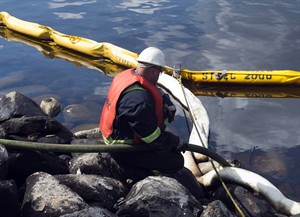
New safety regulations for different types of oil could save lives: Greenpeace
OTTAWA – A leading environmental group says a failure to distinguish between different types of crude — including the potentially volatile nature of so-called shale oil — could cost lives in the future.
Tanker cars that derailed and exploded early on July 6 in Lac-Megantic, Que., east of Montreal, were carrying oil from a large shale deposit in North Dakota known as the Bakken field.
Greenpeace says federal government regulation and safety standards do not distinguish between different types of crude oil, even though the chemical composition can make one type more explosive than another.
Spokesman Keith Stewart says it’s too early to say what role Bakken oil played in the disaster, but he notes safety regulations have not kept pace with a rapid increase in the transportation of new types of oil.
Transportation Safety Board investigators say they are testing what’s left of the oil and the residue in Lac-Megantic to determine what may have been present, but they won’t speculate on whether the type of oil made a difference.
But railway analyst Chris Damas of BCMI Research says the composition of the oil is not a major safety concern and believes that new regulations for different types of crude would make little difference.
Join the Conversation!
Want to share your thoughts, add context, or connect with others in your community? Create a free account to comment on stories, ask questions, and join meaningful discussions on our new site.




















Leave a Reply
You must be logged in to post a comment.